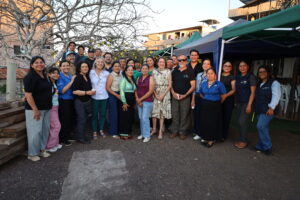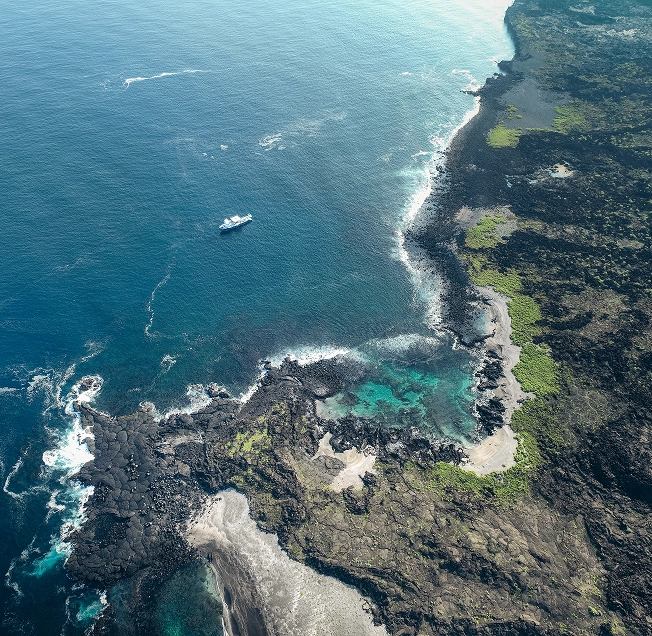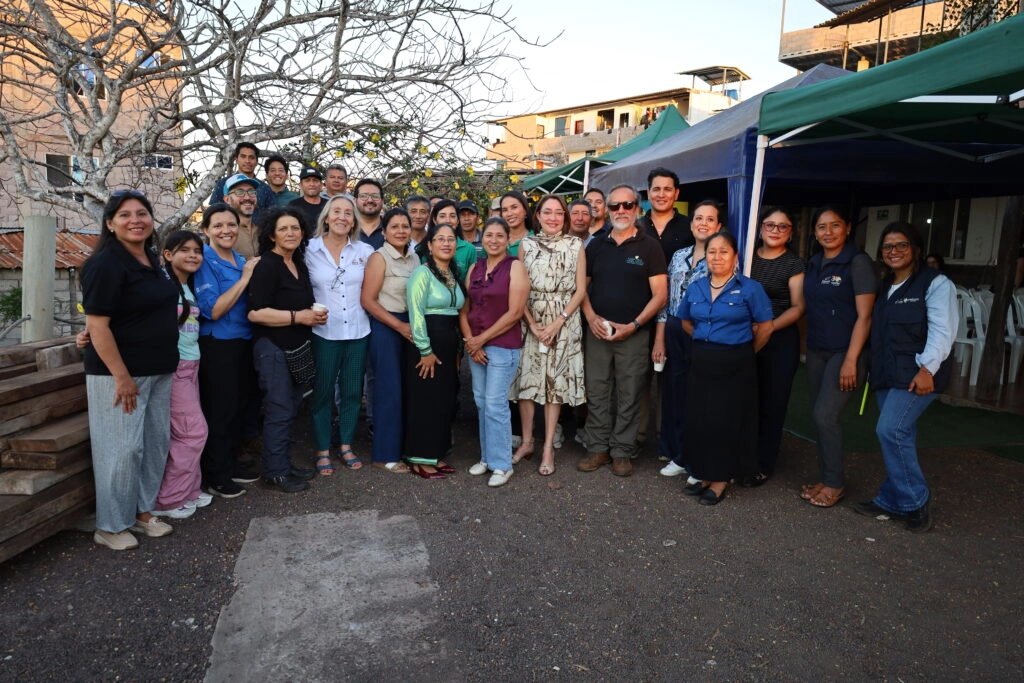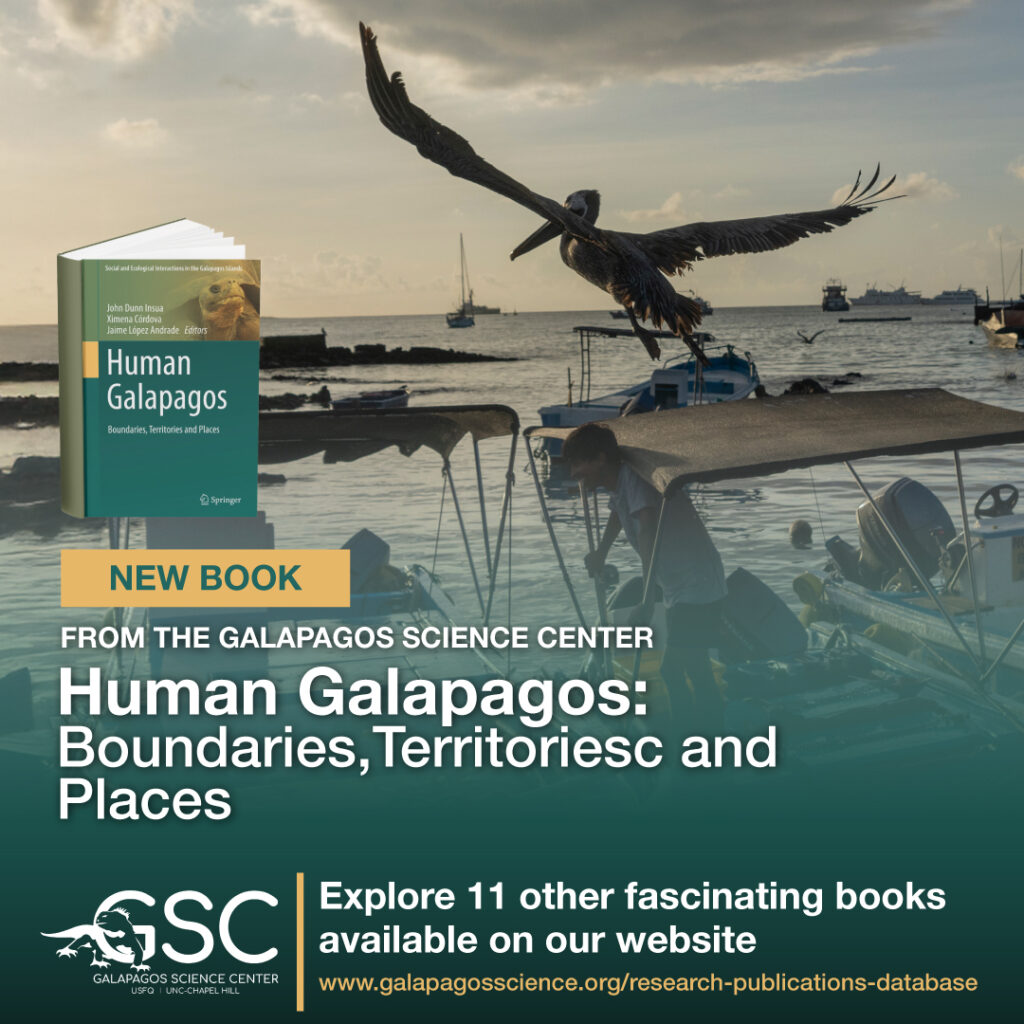
La Universidad de Carolina del Norte en Chapel Hill y la Universidad San Francisco de Quito (USFQ), en Ecuador, crearon el Galapagos Science Center (GSC) en 2011 con el propósito de promover la investigación y el entendimiento de los sistemas sociales y ecológicos de las Islas Galápagos, así como de difundir a nivel mundial un conocimiento más profundo y completo sobre los ecosistemas insulares y las amenazas que enfrentan para su sostenibilidad.
La Iniciativa Galápagos tiene como objetivo contribuir a la conservación de las Islas Galápagos mediante una estrategia innovadora, interdisciplinaria y sostenible.
El Galapagos Science Center está ubicado en Puerto Baquerizo Moreno, en la isla San Cristóbal, dentro del archipiélago de Galápagos.

1
Desarrollar proyectos de investigación interdisciplinarios para la conservación y la sostenibilidad de las Islas Galápagos y de todo el planeta, a través de cinco pilares: cambio medioambiental, salud comunitaria y humana, conservación, océanos y biodiversidad.
2
Contribuir al desarrollo sostenible y a una mayor conciencia ambiental en la comunidad local para comprender mejor las complejas interacciones entre las personas y el entorno en el que viven.
3
Impulsar experiencias de aprendizaje prácticas y significativas mediante la selección estratégica de proyectos de investigación interdisciplinaria, dirigidos a estudiantes locales, nacionales e internacionales.
4
Potenciar una red científica que se nutra de una diversidad de pensamientos, perspectivas, saberes y sostenida por una infraestructura de datos. A través de una ciencia verdaderamente integradora, buscamos tejer una comunidad global de instituciones y académicos comprometidos con explorar, comprender y proteger —de manera innovadora y colaborativa— los ecosistemas insulares del mundo.
Coordinamos proyectos de investigación con científicos locales, nacionales e internacionales en beneficio de Galápagos y de la ciencia mundial.
Proyectos de investigación científica interdisciplinaria
852+
Estudiantes nacionales e internacionales de pregrado, máster y doctorado que se han involucrado en proyectos de investigación
9163+
Miembros de la comunidad beneficiados de las actividades científicas y educativas desarrolladas por GSC
Foto: SMGTagging_©CameronPerry
Galápagos, enero de 2026.- El programa de vinculación con la comunidad del Galapagos Science Center y la Universidad San Francisco de Quito, Reactivando la Economía a través de la Ciencia, la Comunidad y el Trabajo (REACCT+), compartió los avances recientes de los emprendimientos beneficiarios con autoridades locales, instituciones académicas, representantes del gobierno y actores clave del sector productivo, durante visitas técnicas a tres negocios locales. Esta actividad reafirma el compromiso con el desarrollo económico, el impacto comunitario y la conservación ambiental.

Human Galápagos: Boundaries, Territories and Places, un libro que combina ciencia, diseño y sostenibilidad para abordar los retos humanos y ecológicos de las Islas Galápagos. A lo largo de nueve capítulos, explora ideas sobre urbanismo sostenible, biodiversidad, energías renovables, gestión del agua y diseño medioambiental, todo ello centrado en un objetivo claro: la vida humana y su equilibrio con la naturaleza. Esta obra es fruto de la colaboración de expertos internacionales durante la VI Cumbre APRU SCL 2023, que reunió propuestas para nuevas formas de vivir, planificar y coexistir en uno de los ecosistemas más frágiles del planeta.
Human Galápagos: Boundaries, Territories and Places es más que un libro, marca un hito para APRU SCL, ya que se convierte en la primera publicación académica nacida de una de sus conferencias anuales. Forma parte de la reconocida serie Social and Ecological Interactions in the Galápagos Islands (SESGI), que presenta investigaciones pioneras sobre la sostenibilidad y la transformación social en el archipiélago.
Explore nuestras 11 fascinantes publicaciones del GSC aquí:

Interactúa con la isla a través de datos accesibles.
Read our Epub Magazine 2024 Edition
Read our Epub Magazine 2023 Edition
Read our Epub Magazine 2022 Edition

In 2022, the Galapagos Science Center (GSC) and the broader UNC & USFQ Galapagos Initiative will celebrate its 10th Anniversary. We are proud to announce the World Summit on Island Sustainability scheduled to be held on June 26–30, 2022 at the Galapagos Science Center and the Community Convention Center on San Cristobal Island.
The content of the World Summit will be distributed globally through social media and results documented through papers published in a book written as part of the Galapagos Book Series by Springer Nature and edited by Steve Walsh (UNC) & Carlos Mena (USFQ) as well as Jill Stewart (UNC) and Juan Pablo Muñoz (GSC/USC). The book will be inclusive and accessible by the broader island community including scientists, managers, residents, tourists, and government and non-government organizations.
While the most obvious goal of organizing the World Summit on Island Sustainability is to celebrate the 10th Anniversary of the GSC and the UNC-USFQ Galapagos Initiative, other goals will be addressed through special opportunities created as part of our operational planning of the World Summit.
For instance, we seek to elevate and highlight the Galapagos in the island conservation discourse, seeking to interact with other island networks in more obvious and conspicuous ways to benefit the Galapagos Islands, the UNC-USFQ Galapagos Initiative, and the world. We will seize the opportunity to further develop the I2N2 – International Islands Network-of-Networks. Further, we wish to highlight and emphasize multiple visions of a sustainable future for the Galapagos Islands and we cannot do this alone. Therefore, engaging the Ecuadorian Ministry of Environment, the Ministry of Tourism, the Government Council of Galapagos, the Galapagos National Park, and local Galapagos authorities, including government and non-government organizations and local citizen groups, is imperative.

Borrowing from Hawaii’s and Guam’s Green Growth Program and the Global Island Partnership, we wish to examine existing global programs that emphasize island sustainability and their incorporation into life, policies, and circumstances in the Galapagos Islands. We will also seek to enhance our connections with the institutional members of our International Galapagos Science Consortium and expand the Consortium through the recruitment of other member institutions. We will also work to benefit islands and their local communities by working with citizen groups as well as important NGOs who seek to improve the natural conditions in the Galapagos and diminish the impact of the human dimension on the future of Galapagos’ ecosystems.
Lastly, we will use the World Summit to benefit UNC & USFQ and our constituencies through a strong and vibrant communication plan about the World Summit, creating corporate relationships as sponsors, identifying funding goals through donors, and benefiting our study abroad program for student engagement in the Galapagos Islands. We plan to develop and issue a Galapagos Sustainability Communique after the World Summit that includes the vision and insights of all its participants for a sustainable Galapagos with applicability to global island settings.
We are eager to hear your perspective and have you join us at the World Summit on Island Sustainability!